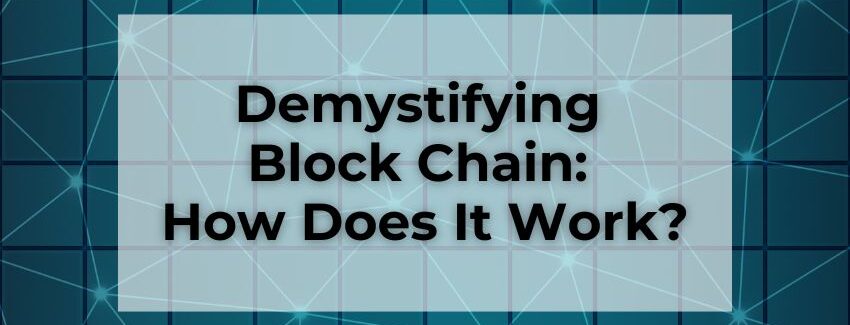Block Chain technology has emerged as a game-changer, captivating industries and individuals with its potential to revolutionize data management and transactions. While Block Chain is widely recognized as the underlying technology powering cryptocurrencies, such as Bitcoin, its applications extend far beyond digital currencies. In this blog, we will demystify how Block Chain works, shedding light on its fundamental concepts and mechanisms.
Understanding the Basics
At its core, a Block Chain is a decentralized, distributed ledger that records and verifies transactions across multiple computers, known as nodes. These nodes work together to maintain the integrity and security of the Block Chain. Each transaction is grouped into a block, which is then added to the chain in a chronological order, forming a transparent and unalterable history of transactions.
Decentralization and Consensus
One of the key features of Block Chain is its decentralization. Unlike traditional systems that rely on a central authority, Block Chain operates on a peer-to-peer network, where every participant has a copy of the entire Block Chain. This decentralized structure eliminates the need for intermediaries, reduces the risk of fraud, and increases trust among participants.
Consensus mechanisms play a vital role in maintaining the integrity of the Block Chain. They ensure that all nodes in the network agree on the validity of transactions and the order in which they are added to the chain. Different consensus algorithms, such as Proof of Work (PoW) and Proof of Stake (PoS), govern how consensus is achieved, offering varying levels of security, scalability, and energy efficiency.
Cryptographic Security
Block Chain employs advanced cryptographic techniques to secure transactions and ensure data integrity. Each transaction is encrypted and linked to the previous one, creating a chain of blocks. Additionally, every block contains a unique identifier, called a hash, which is generated by running the block’s data through a cryptographic algorithm.
These cryptographic hashes not only serve as digital fingerprints of each block but also create a strong link between blocks. If any data in a block is tampered with, the hash of that block changes, alerting the network to the alteration. This immutability makes Block Chain highly resistant to tampering and ensures the integrity of the data stored within.
Smart Contracts
Smart contracts are self-executing contracts with the terms of the agreement directly written into the code. They automate the execution of contractual obligations when predefined conditions are met. Smart contracts are built on Block Chain platforms and are triggered by transactions recorded on the Block Chain.
The introduction of smart contracts has opened up a world of possibilities, enabling automation, reducing the need for intermediaries, and improving the efficiency of transactions. They have applications in various industries, including supply chain management, insurance, finance, and real estate.
Public vs. Private Block Chains
Block Chain networks can be categorized as public or private, depending on their accessibility and permissions. Public Block Chains, like Bitcoin and Ethereum, are open to anyone who wants to participate, and anyone can view and verify transactions on the network. Private Block Chains, on the other hand, restrict access to a specific group of participants, offering greater control and privacy.
Private Block Chains are often used by enterprises and organizations that require more control over their data and transactions, while public Block Chains are embraced by individuals and businesses seeking transparency and inclusivity.
Exploring the Potential
Block Chain technology holds immense potential to transform industries and reshape the way we interact with data and conduct transactions. From streamlining supply chains and enhancing transparency to improving security and empowering individuals, Block Chain offers a range of benefits that can drive innovation and efficiency.
While Block Chain is still an evolving technology and faces challenges such as scalability and regulatory frameworks, its applications continue to expand across various sectors. Governments, businesses, and individuals are exploring its potential and harnessing its power to create a more secure, transparent, and decentralized future.
In conclusion, Block Chain technology has ushered in a new era of decentralized and secure data management and transactions. By leveraging its decentralized nature, consensus mechanisms, cryptographic security, and the power of smart contracts, Block Chain offers a range of benefits that have the potential to transform industries and empower individuals.
Note: In this blog, we opted for the term “Block Chain” instead of “Blockchain” to cater to newcomers in the blockchain space, ensuring the content is more accessible for those readers.









 Thank you!
Thank you!
 Thank you!
Thank you!
 Thank you!
Thank you!




